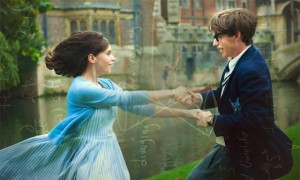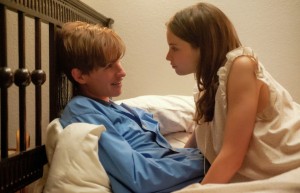
A word of warning to fans of Stephen Hawking. Despite its title, The Theory of Everything isn’t a film about the physicist’s theories on black holes or the beginnings of the universe. Rather, it’s a love story about the famous figure and his relationship with his significant other. It’s an interesting concept that ultimately makes for a solid movie, but one that occasionally loses momentum at it hurtles forward.
 The biopic picks up with brilliant young Stephen Hawking (Eddie Redmayne) meeting Jane (Felicity Jones) at a party while studying at Cambridge. The two become romantically involved, but their relationship comes to a crossroads when Stephen is diagnosed with the neurodegenerative disease ALS. It’s a horrific and fatal condition that will cause the young man to slow lose all control of his muscle tissue. Undaunted, Jane vows to marry her boyfriend and help him fight the condition, but as time passes the disease begins to negatively affect their relationship.
The biopic picks up with brilliant young Stephen Hawking (Eddie Redmayne) meeting Jane (Felicity Jones) at a party while studying at Cambridge. The two become romantically involved, but their relationship comes to a crossroads when Stephen is diagnosed with the neurodegenerative disease ALS. It’s a horrific and fatal condition that will cause the young man to slow lose all control of his muscle tissue. Undaunted, Jane vows to marry her boyfriend and help him fight the condition, but as time passes the disease begins to negatively affect their relationship.
The film’s opening act is concerned almost exclusively with introducing the two young lovebirds and then having them fall for one another. There not a whole lot that the screenwriters can do to amp up the tension, but as presented the movie’s first 30 to 40 minutes carry very little in the way of conflict or drama. Stephen and Jane date while he continues his studies, ignoring a brief tremor or two. Truthfully, it’s difficult to get a handle on who and/or what the movie is actually about early on.
As Stephen’s condition worsens and the strains become clearer, the movie’s focus does become apparent and the film itself far more gripping. In fact, as it shifts to the point of view of Jane, it suddenly becomes an interesting and original take on the Hawking life story. Despite her great affection for Stephen, the woman’s frustrations and eventual resentment at having put aside her own ambitions to look after her husband full-time are examined. Also adding a wrinkle is the appearance of a helpful friend and preacher (Charlie Cox) that leads to consternation on the part of relatives.
 There’s a lot of drama here as the movie explores more unusual aspects of the situation and these matters are sensitively handled by the cast. In fact, the performances themselves are exceptional. Redmayne is completely convincing as Hawking. There isn’t a moment that you don’t think you’re watching the physicist himself, and his mannerisms are remarkable. Jones ably expresses the many highs and lows experienced by Jane through the course of the film.
There’s a lot of drama here as the movie explores more unusual aspects of the situation and these matters are sensitively handled by the cast. In fact, the performances themselves are exceptional. Redmayne is completely convincing as Hawking. There isn’t a moment that you don’t think you’re watching the physicist himself, and his mannerisms are remarkable. Jones ably expresses the many highs and lows experienced by Jane through the course of the film.
While the film only deals with Hawking’s scientific theories in a fast and loose way, there are a few notions and brainstorms that are delivered with some visual panache. Whether inspiration strikes while pulling off a sweater or one of his concepts of time in a black hole is displayed with the domestic drama playing out backwards, it’s handled in a clever and interesting way.
Unfortunately, less effective are the big emotional beats. Frankly, they’re overplayed. As one tragedy follows another, the filmmakers opt to employ a somber piano melody and sweeping strings. When these instruments boom over the theater speakers, the scenes lose a lot of impact. The attempts at manipulation become obvious and they pulled this reviewer out of the picture whenever it occurred. These scenes should have been the film’s strongest and would have played far better had they been put together in a more subtle manner, with less musical accompaniment (although it didn’t seem to stop tears from flowing from others in the audience).
In the end, The Theory of Everything is a well-made and beautifully performed film about an important and inspirational figure. Had the been more focused and not overplayed the sentiment in post-production, it could have achieved greatness. As it stands now, its simply earns a good grade.


